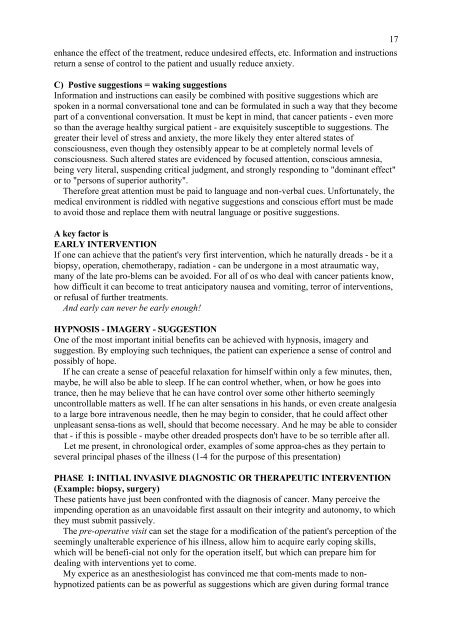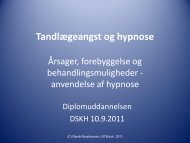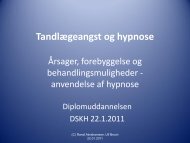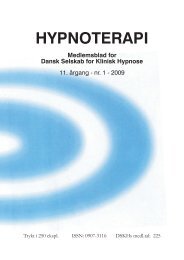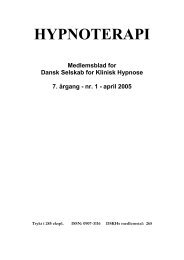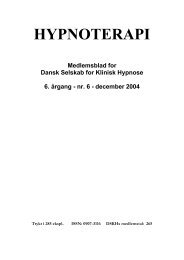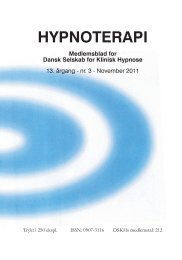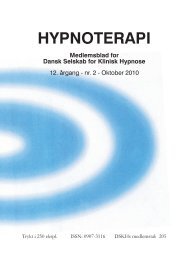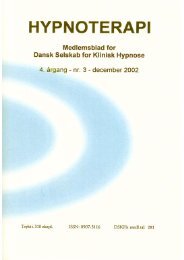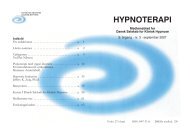HYPNOTERAPl - Dansk Selskab for Klinisk Hypnose
HYPNOTERAPl - Dansk Selskab for Klinisk Hypnose
HYPNOTERAPl - Dansk Selskab for Klinisk Hypnose
Create successful ePaper yourself
Turn your PDF publications into a flip-book with our unique Google optimized e-Paper software.
enhance the effect of the treatment, reduce undesired effects, etc. In<strong>for</strong>mation and instructions<br />
return a sense of control to the patient and usually reduce anxiety.<br />
C) Postive suggestions = waking suggestions<br />
In<strong>for</strong>mation and instructions can easily be combined with positive suggestions which are<br />
spoken in a normal conversational tone and can be <strong>for</strong>mulated in such a way that they become<br />
part of a conventional conversation. It must be kept in mind, that cancer patients - even more<br />
so than the average healthy surgical patient - are exquisitely susceptible to suggestions. The<br />
greater their level of stress and anxiety, the more likely they enter altered states of<br />
consciousness, even though they ostensibly appear to be at completely normal levels of<br />
consciousness. Such altered states are evidenced by focused attention, conscious amnesia,<br />
being very literal, suspending critical judgment, and strongly responding to "dominant effect"<br />
or to "persons of superior authority".<br />
There<strong>for</strong>e great attention must be paid to language and non-verbal cues. Un<strong>for</strong>tunately, the<br />
medical environment is riddled with negative suggestions and conscious ef<strong>for</strong>t must be made<br />
to avoid those and replace them with neutral language or positive suggestions.<br />
A key factor is<br />
EARLY INTERVENTION<br />
If one can achieve that the patient's very first intervention, which he naturally dreads - be it a<br />
biopsy, operation, chemotherapy, radiation - can be undergone in a most atraumatic way,<br />
many of the late pro-blems can be avoided. For all of os who deal with cancer patients know,<br />
how difficult it can become to treat anticipatory nausea and vomiting, terror of interventions,<br />
or refusal of further treatments.<br />
And early can never be early enough!<br />
HYPNOSIS - IMAGERY - SUGGESTION<br />
One of the most important initial benefits can be achieved with hypnosis, imagery and<br />
suggestion. By employing such techniques, the patient can experience a sense of control and<br />
possibly of hope.<br />
If he can create a sense of peaceful relaxation <strong>for</strong> himself within only a few minutes, then,<br />
maybe, he will also be able to sleep. If he can control whether, when, or how he goes into<br />
trance, then he may believe that he can have control over some other hitherto seemingly<br />
uncontrollable matters as well. If he can alter sensations in his hands, or even create analgesia<br />
to a large bore intravenous needle, then he may begin to consider, that he could affect other<br />
unpleasant sensa-tions as well, should that become necessary. And he may be able to consider<br />
that - if this is possible - maybe other dreaded prospects don't have to be so terrible after all.<br />
Let me present, in chronological order, examples of some approa-ches as they pertain to<br />
several principal phases of the illness (1-4 <strong>for</strong> the purpose of this presentation)<br />
PHASE I: INITIAL INVASIVE DIAGNOSTIC OR THERAPEUTIC INTERVENTION<br />
(Example: biopsy, surgery)<br />
These patients have just been confronted with the diagnosis of cancer. Many perceive the<br />
impending operation as an unavoidable first assault on their integrity and autonomy, to which<br />
they must submit passively.<br />
The pre-operative visit can set the stage <strong>for</strong> a modification of the patient's perception of the<br />
seemingly unalterable experience of his illness, allow him to acquire early coping skills,<br />
which will be benefi-cial not only <strong>for</strong> the operation itself, but which can prepare him <strong>for</strong><br />
dealing with interventions yet to come.<br />
My experice as an anesthesiologist has convinced me that com-ments made to nonhypnotized<br />
patients can be as powerful as suggestions which are given during <strong>for</strong>mal trance<br />
17


